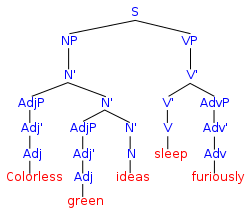
Back لغة متصرفة Arabic Formal dillər Azerbaijani Формален език Bulgarian Formalni jezik BS Llenguatge formal Catalan زمانی شێوەیی CKB Formální jazyk Czech Formalsprog Danish Formale Sprache German Τυπική γλώσσα Greek
This article needs additional citations for verification. (March 2024) |
| Part of a series on |
| Formal languages |
|---|

In logic, mathematics, computer science, and linguistics, a formal language consists of words whose letters are taken from an alphabet and are well-formed according to a specific set of rules called a formal grammar.
The alphabet of a formal language consists of symbols, letters, or tokens that concatenate into strings called words.[1] Words that belong to a particular formal language are sometimes called well-formed words or well-formed formulas. A formal language is often defined by means of a formal grammar such as a regular grammar or context-free grammar, which consists of its formation rules.
In computer science, formal languages are used, among others, as the basis for defining the grammar of programming languages and formalized versions of subsets of natural languages, in which the words of the language represent concepts that are associated with meanings or semantics. In computational complexity theory, decision problems are typically defined as formal languages, and complexity classes are defined as the sets of the formal languages that can be parsed by machines with limited computational power. In logic and the foundations of mathematics, formal languages are used to represent the syntax of axiomatic systems, and mathematical formalism is the philosophy that all of mathematics can be reduced to the syntactic manipulation of formal languages in this way.
The field of formal language theory studies primarily the purely syntactic aspects of such languages—that is, their internal structural patterns. Formal language theory sprang out of linguistics, as a way of understanding the syntactic regularities of natural languages.
- ^ See e.g. Reghizzi, Stefano Crespi (2009). Formal Languages and Compilation. Texts in Computer Science. Springer. p. 8. Bibcode:2009flc..book.....C. ISBN 9781848820500.
An alphabet is a finite set